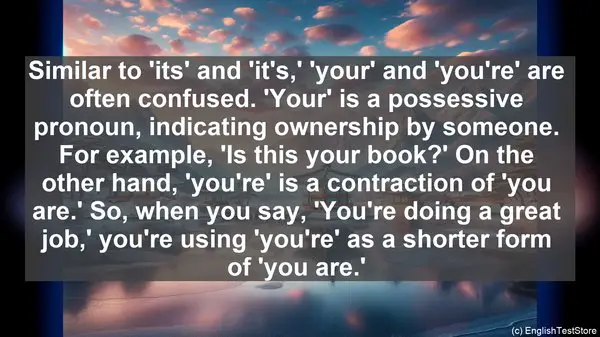Introduction to Lexicography
Welcome to today’s lesson. Before we dive into the world of commonly confused words, let’s quickly understand what lexicography is. Lexicography is the practice of compiling, writing, and editing dictionaries. It involves meticulous research, analysis, and interpretation of words, their meanings, and usage.
1. Affect vs. Effect
One of the most common confusions in lexicography is between ‘affect’ and ‘effect.’ ‘Affect’ is usually a verb, meaning to influence or have an impact on something. On the other hand, ‘effect’ is often a noun, representing the result or consequence of an action. Remember, ‘affect’ is the action, and ‘effect’ is the end result.
2. Complement vs. Compliment
Another pair that often causes confusion is ‘complement’ and ‘compliment.’ ‘Complement’ refers to something that completes or enhances another thing. For example, ‘The red curtains complement the blue walls.’ On the other hand, ‘compliment’ is an expression of praise or admiration. So, when you appreciate someone, you’re giving them a compliment, not a complement.

3. Its vs. It’s
The difference between ‘its’ and ‘it’s’ is a common source of confusion. ‘Its’ is a possessive pronoun, indicating ownership. For example, ‘The dog wagged its tail.’ On the other hand, ‘it’s’ is a contraction of ‘it is’ or ‘it has.’ So, when you say, ‘It’s a beautiful day,’ you’re using ‘it’s’ as a shorter form of ‘it is.’
4. Their vs. There vs. They’re
Three words that sound similar but have different meanings are ‘their,’ ‘there,’ and ‘they’re.’ ‘Their’ is a possessive pronoun, indicating ownership by multiple people. ‘There’ is an adverb, indicating a place or location. And ‘they’re’ is a contraction of ‘they are.’ So, when you say, ‘They’re going to their favorite restaurant. It’s right over there,’ you’re using all three words correctly.
5. Your vs. You’re
Similar to ‘its’ and ‘it’s,’ ‘your’ and ‘you’re’ are often confused. ‘Your’ is a possessive pronoun, indicating ownership by someone. For example, ‘Is this your book?’ On the other hand, ‘you’re’ is a contraction of ‘you are.’ So, when you say, ‘You’re doing a great job,’ you’re using ‘you’re’ as a shorter form of ‘you are.’
6. Then vs. Than
The difference between ‘then’ and ‘than’ is often overlooked but important. ‘Then’ is an adverb, indicating a specific time or sequence. For example, ‘We went to the park, and then we had lunch.’ On the other hand, ‘than’ is a conjunction, used to compare two things. So, when you say, ‘I’m taller than my brother,’ you’re using ‘than’ to show the comparison.
7. Lose vs. Loose
The words ‘lose’ and ‘loose’ are often interchanged, but they have different meanings. ‘Lose’ is a verb, meaning to misplace or not win. For example, ‘I don’t want to lose my keys.’ On the other hand, ‘loose’ is an adjective, meaning not tight or secure. So, when you say, ‘The knot is loose,’ you’re referring to it not being tight.
8. Accept vs. Except
Two words that are similar in spelling but have different meanings are ‘accept’ and ‘except.’ ‘Accept’ is a verb, meaning to receive or agree to something. For example, ‘I accept your apology.’ On the other hand, ‘except’ is a preposition, indicating exclusion. So, when you say, ‘Everyone is going, except for John,’ you’re indicating that John is excluded.
9. Principal vs. Principle
The words ‘principal’ and ‘principle’ are often confused, but they have distinct meanings. ‘Principal’ is a noun, referring to the head of a school or an important person. On the other hand, ‘principle’ is a noun, representing a fundamental truth or belief. So, when you say, ‘The principal announced the new rules,’ you’re referring to the head of the school.
10. Stationary vs. Stationery
The final pair on our list is ‘stationary’ and ‘stationery.’ ‘Stationary’ is an adjective, meaning not moving or still. For example, ‘The car was stationary at the traffic signal.’ On the other hand, ‘stationery’ is a noun, referring to writing materials. So, when you say, ‘I need to buy some stationery,’ you’re talking about pens, papers, etc.

